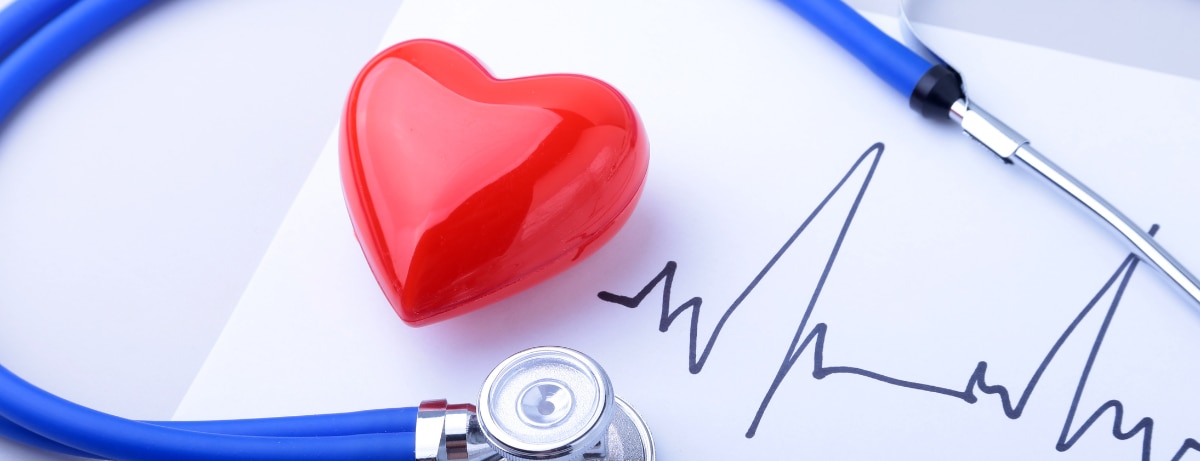15% off €25
A guide to common heart problems

From angina and heart attacks to heart palpitations and heart failure, there are many types of conditions that can affect the heart and they are all known as heart disease. Here you’ll find out more about different types of heart conditions and their causes.
Angina
Angina is chest pain or discomfort that is a symptom coronary heart disease. It is often triggered by stress or physical activity. Angina tends to happen when blood supply to the heart muscles becomes restricted. Angina attacks usually only last for a few minutes and can feel like tightness in the chest that spreads to areas like the neck, back, stomach or arm. It happens when the arteries that supply blood to the heart narrow and harden due to a build-up of fatty substances. Eating a diet high in saturated fat, aging, smoking and obesity can all contribute to the condition.
Arrhythmias
Arrhythmias
Millions of people in the UK experience arrhythmias (irregular heartbeats) every year. An abnormal heart rhythm can affect people of any age with common symptoms including dizziness, fainting, shortness of breath and heart palpitations. Drinking too much alcohol, smoking, caffeine drinks, medications and being overweight can trigger arrhythmia. Severe heart conditions can also cause arrhythmia.


Cardiac arrest
A cardiac arrest happens when the heart stops pumping blood around the body and breathing is affected. Cardiac arrests can happen because of a heart attack, but they are not the same thing. People experiencing cardiac arrests tend to collapse all of a sudden and become unresponsive. Immediate medical attention is required.
Congenital heart disease
A congenital condition is one that someone is born with. Congenital heart disease refers to the many different types of birth defects that can affect the normal workings of the heart. Tiredness, sweating, shortness of breath, chest pain and heartbeat or breathing that is faster than normal are common signs. According to the NHS, congenital heart disease is one of the most common types of birth defect and affects around 9 in every 1,000 babies born in the UK. In most cases, there is no obvious cause but some conditions can be passed through family members. During pregnancy, taking certain medications or drinking alcohol increase chances of the condition. Babies born with Down’s syndrome also tend to have congenital heart disease.
Coronary heart disease
Coronary heart disease
There are millions of people in the UK living with coronary heart disease (CHD). CHD is also a major cause of death all over the world and in the UK. It’s normally caused by fatty deposits building up in the arteries which makes them narrower and restricts blood flow to the muscles of the heart. Smoking, having a high blood cholesterol level, being overweight or obese, diabetes and a family history of CHD can increase your risk of developing the disease.


Heart Attack
Often confused with a cardiac arrest, a heart attack is when one of the blood vessels that supplies blood to the heart becomes blocked. This means the heart doesn’t get the supply of oxygen-rich blood it needs. Because of this, heart attacks can be fatal and need to be treated straight away. Chest tightness, pain or pain in the neck, jaw, arms or back are common signs of a heart attack. Coronary heart disease is the most widespread cause of heart attacks due to a build-up of fatty materials in the blood vessels which can cause blood clots to form.
Heart failure
This is when the heart is not able to pump blood around the body properly. Although it is more common in the elderly, it can happen at any age. There is no cure for the condition and it tends to get worse over time, but it’s possible to manage symptoms for many years. Heart failure is often caused by more serious conditions like coronary heart disease, high blood pressure, arrhythmias and birth defects which disturb the way the heart works. In some cases, an overactive thyroid, drinking excessive amounts of alcohol and anaemia can also lead to heart failure.
Heart palpitations
If your heart feels like it’s fluttering, pounding or beating irregularly for a few minutes, you may be experiencing palpitations. They may seem worrying, but more often than not they aren’t a sign of a serious problem. Stress, lack of sleep, panic attacks as well as energy drinks and drinks containing caffeine are common causes of palpitations. In some cases, hormonal changes during pregnancy, periods or the menopause can also trigger heart palpitations in women.
Finding out what causes heart problems is the first step to preventing them and looking after your heart for the future ahead.



